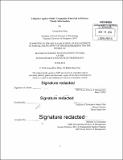Litigation against public companies that fail to disclose timely information
Author(s)
Leong, Hein Hing
DownloadFull printable version (3.226Mb)
Other Contributors
Sloan School of Management.
Advisor
Christopher Francis Noe.
Terms of use
Metadata
Show full item recordAbstract
Every year, between 150 and 200 class action lawsuits are filed against public listed companies in the United States. When disclosure of the lawsuits is made to the investing public, the stock prices of these companies usually react negatively with large declines. Yet, in each year, there are also many publicly listed companies that experience large daily declines without facing investors' wrath of a lawsuit. 152 class action litigation cases in the US were recorded for 2012. This paper investigates (i) what are the noticeable differences in headlines and news details between the litigation group and the comparable group; (ii) why some cases in the litigation group did not experience large stock declines and (iii) what are the common wrongdoings by the US-listed Chinese firms. The results reveal the following findings (i) the litigation group, with the exception of financial restatements and fraud, carry headlines that are similar to the comparable group but details indicate an overuse of optimistic statements that got them into trouble; (ii) companies in the litigation group that did not experience large stock declines on the disclosure date tended to be larger in market capitalization which made the disclosure loss relatively smaller than other companies that met with large stock declines. Yet, with smaller disclosure losses by these large companies, the average market capitalization loss on the disclosure date was larger than the companies that faced large percentage losses, thus suggesting a firm-effect in the results. Furthermore, these companies had more than twice the maximum dollar loss suggesting that their stock prices had been experiencing a slow but gradual decline over the class action period instead of a large loss on the disclosure date; (iii) Chinese firms differ from their litigation counterparts in that these companies have weak internal controls, performing actions that appear to treat the publicly-listed company as a sole proprietorship company.
Description
Thesis: S.M. in Management Studies, Massachusetts Institute of Technology, Sloan School of Management, 2014. Cataloged from PDF version of thesis. Includes bibliographical references (pages 42-43).
Date issued
2014Department
Sloan School of ManagementPublisher
Massachusetts Institute of Technology
Keywords
Sloan School of Management.